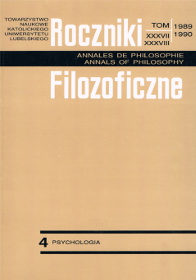Psychometryczne wskaźniki samoakceptacji
Abstrakt
Rogers and Maslow assumed that the self-acceptance is one of the basic factors of a good functioning and an effective orientation toward the personal growth and the self-actualization. It is often operationally defined in terms of the psychometric data of Heilbrun and Gough Adjective Check List (ACL). There are three ratios for the estimation of the self-acceptance (SA): (1) the number of positive adjectives checked (Fav) to the total number of adjectives checked (NoCfd); (2) the number of positive adjectives checked (Fav) to the number of negative adjectives checked (Unfav); and (3) the index D, the measure of the distance between the scales of the real and the ideal self-concept. The D indicator is usually interpreted (C. Rogers) in terms of a congruence between the real and the ideal self-concept; though D ratio based on Pitagoras’ formula limits this rogerian interpretation. For I propose a new SaPB ratio. It is a kind of a regression equation based upon the selected independent variables of the differences between the real and the ideal self- -concept and the coefficient of the security feeling as a dependent variable. Four SA indices were calculated for 375 students who completed the ACL test responding on two questions: Who I am? Whom I would like be? Additionally, Ss completed Uchnast’s Security Syndrome Questionnaire based on Maslow's theory of motivation. Two indices which take into account the number of positive adjectives (scale Fav) significantly discriminate two experimental groups in 34 scales of the real self-concept, though they discriminate only in one scale (NoCfd) of the ideal self-concept. Meanwhile, the ratios D and SaPB discriminate significantly enough the experimental groups both in the real and, in the ideal self-concept of the ACL test scales. However’ the ratio SaPB allows more precise interpretation of the outcomes in terms of the psychological counseling and the psychotherapy formulated in the humanistic orientation.
Copyright (c) 1990 Roczniki Filozoficzne

Utwór dostępny jest na licencji Creative Commons Uznanie autorstwa – Użycie niekomercyjne – Bez utworów zależnych 4.0 Międzynarodowe.





